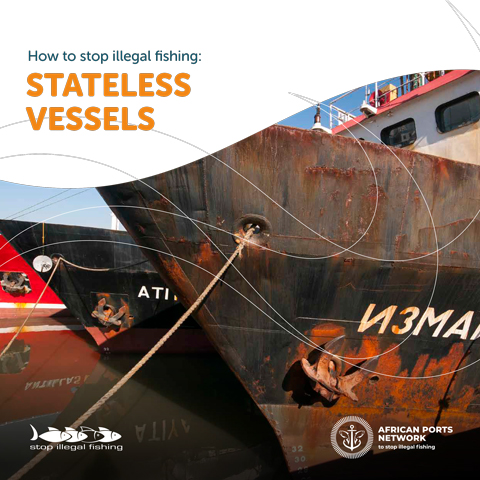How to Stop Illegal Fishing: Stateless Vessels
How to Stop Illegal Fishing: Stateless Vessels provides enforcement officers, policy makers and decision takers with the knowledge needed to address vessels without nationality.
How to Stop Illegal Fishing: Stateless Vessels explains:
- the meaning of “stateless vessels”;
- why, when and by whom stateless vessels can be boarded, inspected or detained;
- how and why stateless vessels can be denied port access and use;
- actions and measures that may be taken where there is evidence of statelessness;
- the impact of statelessness on the rights of crew;
- steps needed to prevent the insurance of stateless vessels.
Stateless vessels – including fishing vessels and carrier vessels – commonly feature in cases of illegal, unreported and unregulated (IUU) fishing and related crimes. They sail without a flag – i.e., are not registered in any country – or with two or more flags, using them according to convenience.
Vessels are legally required to have nationality to operate anywhere. They acquire the nationality of a State by being registered only in that State. This is essential because the flag State is responsible for effective control over its nationals and vessels, including on the high seas.
Vessels may become stateless when flag States take action to de-register their vessels that are identified as being involved in illegal activity, including IUU fishing and related activities. This can be done through national enforcement action or by being placed on an IUU vessel list of a regional fisheries management organisation (RFMO). Once de-registered, a recognised IUU vessel can find it difficult to obtain a new registration.
A recent case involves a known toothfish poacher COBIJA (ex CAPE FLOWER) that continued to fish illegally after it was listed on an RFMO IUU vessel list. By changing names and operating as a stateless vessel it offloaded high value toothfish using fake registration documents. By targeting ports in States with low capacity or weak governance and producing a series of faked and forged documents, COBIJA has shown itself to be a persistent and systematic offender. (For more inforamtion see FISH-i Africa Investigation No. 22).
Judith Swan, legal expert, stated, “These ‘bad actors’ or stateless vessels present enforcement officers with a constant challenge as the nationality of ships provides the basis for maintaining order on the high seas: the absence of any authority over ships on the high seas would lead to chaos. The 1982 United Nations Convention on the Law of the Sea (UNCLOS) requires States to determine the conditions for the granting of its flag – and therefore its nationality – to vessels. Stateless vessels aim to avoid any control.”
It is the flag State that has always had the primary responsibility for enforcement of their vessels on the high seas. They must exercise “effective control” over their vessels, for example by issuing authorisations for high seas fishing; ensuring monitoring, control and surveillance (MCS) of the vessel and its compliance with national, regional and international law; and ensure that its flag vessels comply with RFMO measures and do not undermine their effectiveness.
The international community continues to develop rules – and enforcement mechanisms – on a global and regional basis to deal with ‘bad actors’ on the high seas, and to control the activities of non-national vessels in areas under national jurisdiction. An example that is gaining enormous support is the 2009 Food and Agriculture (FAO) Agreement on Port State Measures to Prevent, Deter and Eliminate IUU Fishing (PSMA). The PSMA sets the international minimum standards for allowing foreign fishing vessels to use parties’ ports, and enforcement of these standards is resulting in stateless vessels being denied port access or use around the world.
Strengthening action against stateless vessels will target vessels and operators that are intentionally operating in the dark zone of illegality and criminality.
A number of FISH-i Africa and Stop Illegal Fishing investigations feature stateless vessels:
- IUU Listed Vessels De-flagged (FISH-i Africa investigation No.3).
- A Repeat Offender Brought to Book: the NESSA 7 (FISH-i Africa investigation No.9).
- Regional and International Cooperation Nets Illegal Vessel (FISH-i Africa investigation No.16).
- COBIJA Exploits Weak States to Escape Sanctions (FISH-i Africa investigation No.22).
- Prosecution of TAWARIQ 1 (SIF Case Study 14).
The ‘How to Stop Illegal Fishing’ series
The ‘How to Stop Illegal Fishing’ series aims to improve awareness and understanding of the roles and responsibilities of different actors in stopping illegal fishing. It targets the needs of African fisheries and countries, is based on evidence and analysis, and places legality in the fisheries sector as an essential element of sustainable development. This guidance has been compiled with the help of Judith Swan and has drawn on evidence produced by the FISH-i Africa Task Force and the Stop Illegal Fishing Investigative Unit.
Previous HTSIF publications include:
How to Stop Illegal Fishing: Port States
How to Stop Illegal Fishing: Flag States
How to Stop Illegal Fishing: Stateless Vessels is available for download in English, French and Portuguese.
Credits
Publishing of this flyer has been supported by the Deutsche Gesellschaft für Internationale Zusammenarbeit (GIZ) and The German Federal Ministry for Economic Cooperation and Development (BMZ), through the Port State Measures to Stop Illegal Fishing (PSM-SIF) project.
